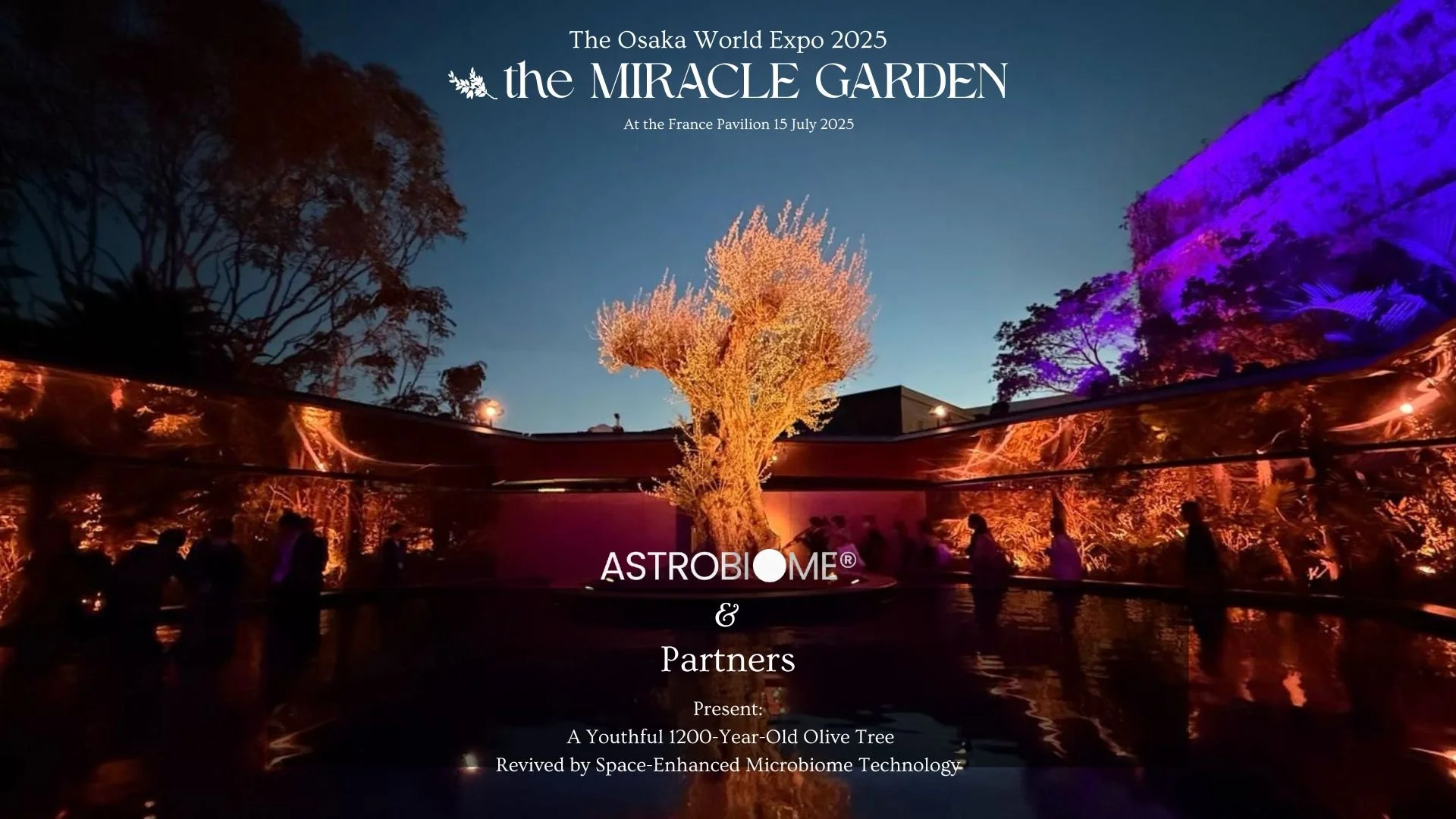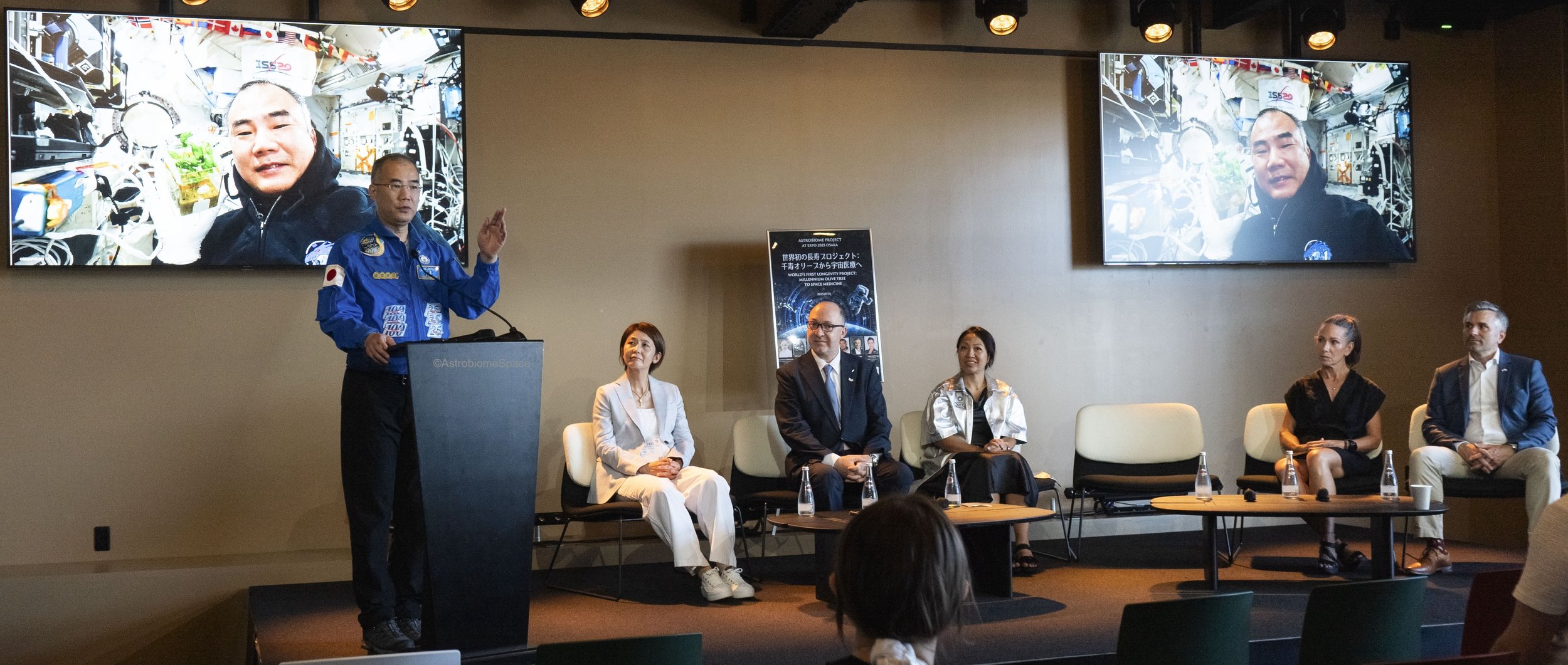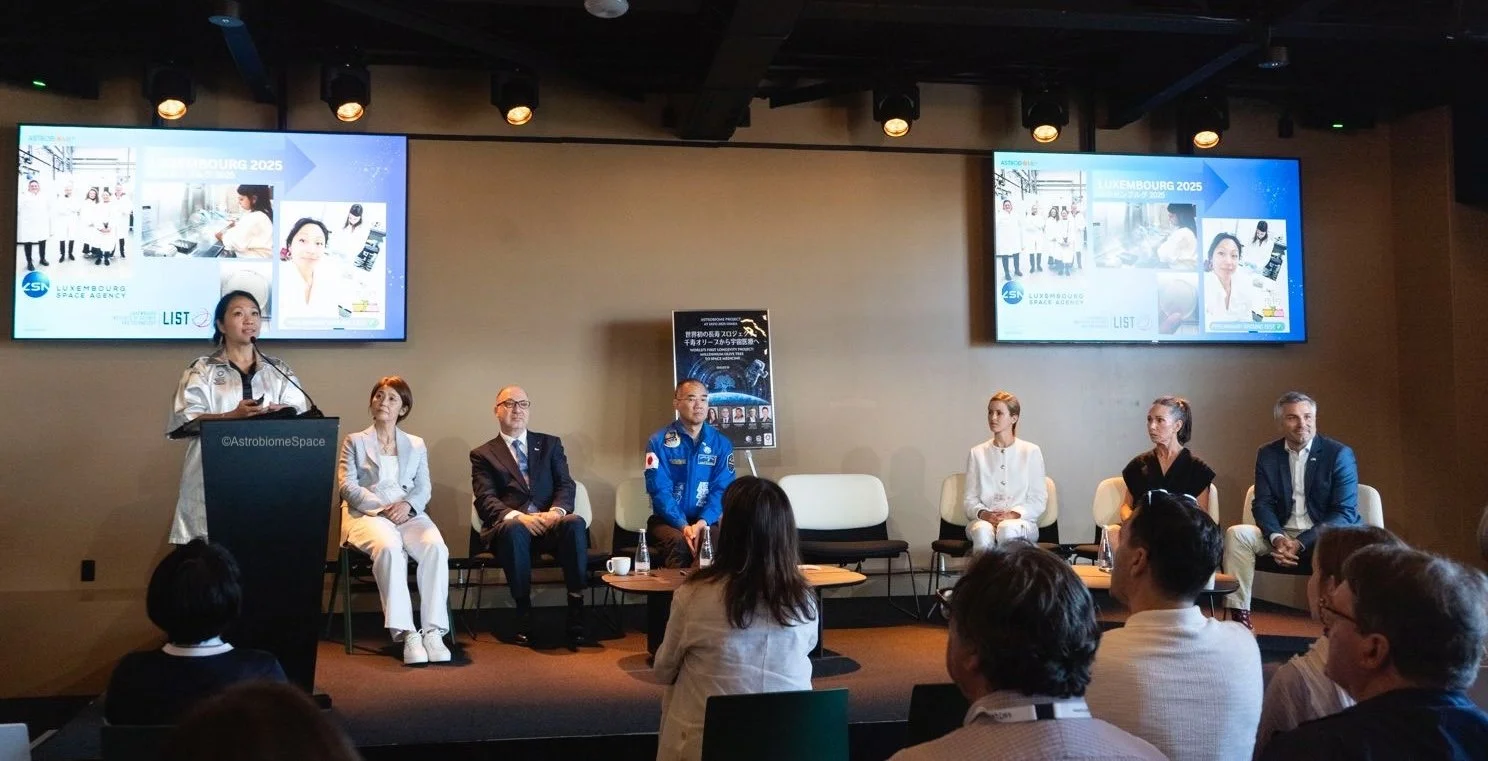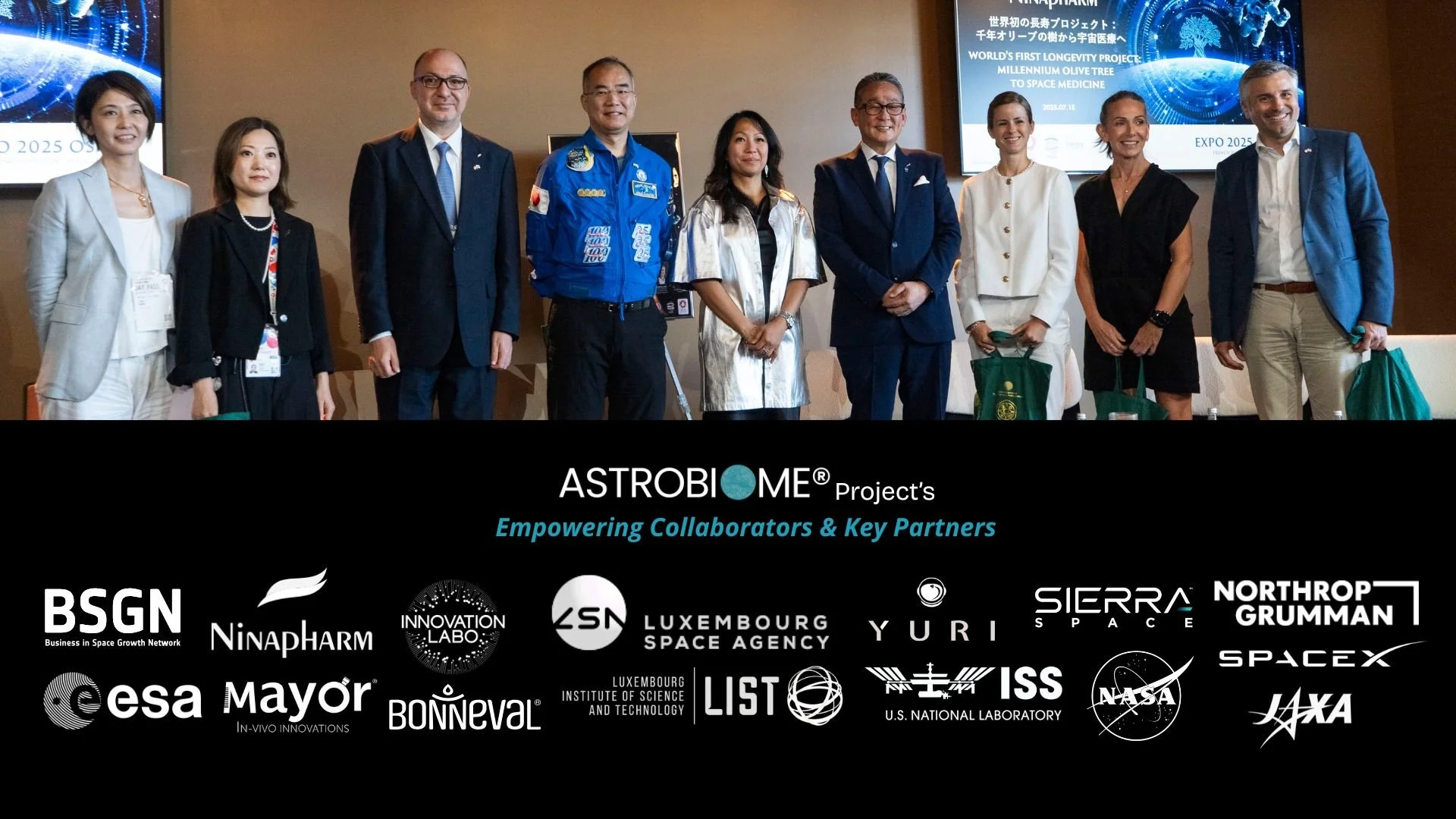Astrobiome Space Symposium
A Groundbreaking Project at the Osaka World Expo 2025
Osaka, Japan – July 15, 2025
On the global stage of the Osaka Expo 2025, the France Pavilion welcomed a pioneering symposium that brought together microbiome science, nature, and space exploration under one visionary theme:
Astrobiome: The First to Bring Millennial Olive Tree Microbiome to Space Medicine
Hosted at the France Pavilion, the symposium was organized by Astrobiome Space SARL, a Luxembourg-based company, in collaboration with Ninapharm and Innovation Labo Sciences, Ltd, a Japan-based microbiome research lab. Together, these thought leaders and leading researchers were engaging the Osaka World Expo visitors one of the most pressing conversations of our time, sharing about their explored groundbreaking advancements in wellness, food, and longevity microbiomes to be among the health in space solutions and vice-versa;
How space can help with health on Earth, bringing solutions to aging with vitality and prevention, instead of enduring chronic illness or prolonged decline.
Space presents an environment vastly different from Earth—characterized by microgravity, high radiation exposure, isolation, disrupted circadian rhythms, and limited resources. These extreme conditions place immense stress on the human body, particularly at the cellular and mitochondrial levels, where the foundations of health, energy, and aging reside.
The visionary Astrobiome Project explores the intersection of terrestrial biology and future human resilience in space. Rooted in the microbiome of a millennial olive tree, the project aims to unlock the secrets of cellular longevity that could revolutionize life on Earth and enhance human health in extraterrestrial environments.
Dr Bejit Ideas, Chief Scientist of Astrobiome Space, inventor at the Innovation Labo Sciences, Ltd, opened the conference by reminding the vital link of evolution and resilience to human longevity. He also shared about the genesis of the Astrobiome project going back to 25 years of microbiome evolution research conducted at Innovation Labo, the world’s first extreme environment bacteria co-culturing research platform.
Vera Mulyani, a pioneer in master planning human destinations on Mars, Founder and CEO of Astrobiome Space, SARL, gathered a prestigious panel of global pioneers for this symposium:
Astronaut Soichi Noguchi, a former JAXA astronaut among the SpaceX Crew-1, shared insights from his multiple missions aboard the Space Shuttle, Soyuz, and SpaceX Crew Dragon, offered a unique perspective on how spaceflight affects the human body—and the urgent need for microbial solutions to sustain long-duration missions.
Dr. Jennifer Fogarty, a former Chief Scientist of the NASA’s Human Research Program (HRP), leading aerospace human health and performance expert, emphasized the critical role of preventative medicine, which goes beyond curing diseases. She highlighted how the health of the microbiome plays a vital role in maintaining astronaut health, resilience, and adaptability beyond Earth's atmosphere. This is not only essential for the success of space missions but also for ensuring the long-term well-being of astronauts, as they face the unique challenges of extended space travel.
Mathias Link, the Deputy CEO of the Luxembourg Space Agency, highlighted the Agency’s missions that led to Astrobiome Space being one of the companies supported by LSA. He emphasized how the company's space mission not only benefits Earth but also fosters international collaboration with organizations such as NASA, JAXA, ESA, and LSA. The mission unites space exploration, agriculture, food security, and health, presenting significant commercial opportunities and high potential for a strong business case.
Beside the space focus panelists Mulyani also presented the commercial application cases of Astrobiome® postbiotics applied on everyday’s food and beverages:
Chef Olivier Chaignon, Executive Chef of the 3-Michelin-starred L’Osier in Tokyo, introduced the concept of Microbiome Farming as a new frontier in gastronomy, represented by Tomoka Tamura. Emphasizing how cultivating ingredients in microbiome-rich environments—such as soil enhanced with beneficial bacteria—can naturally boost the nutritional and sensory quality of food. He pioneers a future where chefs collaborate with scientists to co-create ingredients that support both human health and planetary sustainability.
Sophie Burrus-Müller, the creator of the Chocolkan Brain Longevity Project who formulated a no-dairy chocolate drinks that can improve our memory, enhancing brain cell repair to promote longevity..
David Merle, CEO of Bonneval Waters, provided an insightful example of how Astrobiome's innovative technology can be applied to beverages. He highlighted the potential of integrating Astrobiome's advanced microbiome solutions into energy drinks, offering enhanced health benefits and longevity. By harnessing space-enhanced postbiotics like those used by Astrobiome®, commercial products can be elevated to offer superior, science-backed health solutions that support human well-being.
Astronaut Soichi Noguchi showed his salad grown in space as part of his “food therapy”.
Vera Mulyani shared about the successful first Milestone for Astrobiome Space project in collaboration with the Luxembourg Space Agency.
Dr. Bejit Ideas asking about the astronaut’s favorite food.
A Panel-selfie with astronaut Soichi Noguchi, Mathias Link (Deputy CEO of LSA) and the LSA Delegation, at the Astrobiome Space Symposium, Osaka World Expo 2025.
“The answers to longevity may lie in the most ancient life forms on our planet”
The Astrobiome Project represents a convergence of space research, microbiome science, and innovative biotechnology, bringing together interdisciplinary expertise to enhance humans’, their ecosystem’s health and resilience. By harnessing the power of space-exposed microbiomes, the project aims to develop advanced biostimulants that not only support astronaut’s food and health but also improve agricultural sustainability on Earth.
The olive tree microbiome will reach its next milestone this summer, as one of its key microbial strains is scheduled to board on the International Space Station, an experiment conducted by Astrobiome Space, under the support of the Luxembourg Space Agency, hosted by the Luxembourg Institute of Science and Technology, marking a significant advancement in microbiome science innovation.







